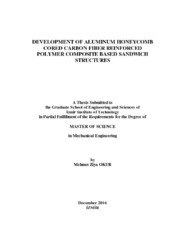Please use this identifier to cite or link to this item:
https://hdl.handle.net/11147/5735Full metadata record
| DC Field | Value | Language |
|---|---|---|
| dc.contributor.advisor | Tanoğlu, Metin | - |
| dc.contributor.author | Okur, Mehmet Ziya | - |
| dc.date.accessioned | 2017-06-12T07:06:38Z | - |
| dc.date.available | 2017-06-12T07:06:38Z | - |
| dc.date.issued | 2016-12 | - |
| dc.identifier.citation | Okur, M. Z. (2016). Development of aluminum honeycomb cored carbon fiber reinforced polymer composite based sandwich structures. Unpublished master's thesis, Izmir Institute of Technology, Izmir, Turkey | en_US |
| dc.identifier.uri | http://hdl.handle.net/11147/5735 | - |
| dc.description | Thesis (Master)--Izmir Institute of Technology, Mechanical Engineering, Izmir, 2016 | en_US |
| dc.description | Full text release delayed at author's request until 2019.11.08 | en_US |
| dc.description | Includes bibliographical references (leaves. 71-76) | en_US |
| dc.description | Text in English; Abstract: Turkish and English | en_US |
| dc.description | xiii, 76 leaves | en_US |
| dc.description.abstract | Lightweight composite sandwich structures are composed of composite structures that are laminated between thin stiff facesheets bonded to a thicker lightweight core. These structures have high potatial to be used in civil engineering applications, marine, aerospace industry etc. applications due to their high strength to weight ratios and energy absorption capacity. In these structures, the bending loads are generally carried by the force couple formed by the face sheets while the shear loads are carried by the lightweight core materials. Main purpose of the core material is to provide a high moment of inertia. Therefore, under flexural loading, sandwich panels have higher specific mechanical properties relative to the monocoque structures. Also, the core resists transverse forces and stabilizes the laminates against global buckling and local buckling. The resulting structure provides increased buckling resistance and its rigidity. In this study, sandwich composite structures were developed with carbon fiber reinforced polymer composite facesheets and the cores made by Aluminum (Al) based honeycomb with various thicknesses. Carbon fiber/epoxy composite facesheets were fabricated with non-woven unidirectional (UD) fabrics (with 0o/90o orientation) and epoxy resin by vacuum infusion technique. Al honeycomb layers were sandwiched together with carbon/epoxy facesheets using a thermosetting adhesive. Mechanical tests were carried out to determine the mechanical behavior of face sheets, aluminum cores and the composite sandwich structures. Effect of core thickness on the mechanical properties of the sandwich structures was investigated. | en_US |
| dc.description.abstract | Hafif kompozit sandviç yapılar, ince rijit yüzey plakaları arasına yerleştirilen daha kalın hafif ara tabakanın lamine edilmesiyle oluşmaktadırlar. Bu yapılar, ağırlıklarına oranla yüksek mukavemet ve enerji sönümleme kabiliyetlerinden dolayı inşaat mühendisliği uygulamaları, denizcilik, havacılık ve uzay endüstrisi gibi uygulamalarda yüksek kullanım potansiyeline sahiptirler. Bu yapılarda, genellikle eğilme yükü yüzey plakaları tarafından oluşturulan kuvvet çifti tarafından taşınırken, kayma yüklerini hafif ara tabaka malzemeleri taşır. Ara tabaka malzemesinin asıl amacı, yüksek bir atalet momenti sağlamaktır. Bu yüzden, eğilme yükleri altında sandviç paneller, monokok (tek kabuklu) yapılara oranla daha yüksek özgül mekanik özelliklere sahiptir. Ayrıca, ara tabaka yanal kuvvetlere karşı direnç göstermekte ve lamineleri global ve lokal burkulmalara karşı dengelemektedir. Ortaya çıkan yapı, eğilme direncinin ve rijitliğinin artmasını sağlamaktadır. Bu çalışmada, karbon fiber takviyeli polimer kompozit yüzey (kabuk) tabakaları ve Alüminyum (Al) esaslı bal peteği geometrisine sahip farklı kalınlıklardaki ara tabakadan oluşan kompozit sandviç yapılar geliştirilmiştir. Karbon fiber/epoksi kompozit yüzey tabakaları (0o/90o yönelimiyle) örgüsüz tek yönlü karbon fiber ve epoksi reçine ile vakum infüzyon yöntemiyle üretilmiştir. Alüminyum bal peteği tabakaları, karbon/epoksi yüzey plakaları ile birlikte termoset bir yapıştırıcı kullanılarak sandviç haline getirilmiştir. Yüzey plakaları, alüminyum ara tabakalar ve kompozit sandviç yapıların mekanik davranışlarını belirlemek için mekanik testler gerçekleştirilmiştir. Ara tabaka kalınlığının sandviç yapıların mekanik özelliklerine etkisi incelenmiştir. | en_US |
| dc.language.iso | en | en_US |
| dc.publisher | Izmir Institute of Technology | en_US |
| dc.rights | info:eu-repo/semantics/openAccess | en_US |
| dc.subject | Sandwich structures | en_US |
| dc.subject | Energy absorption | en_US |
| dc.subject | Carbon fiber | en_US |
| dc.subject | Aluminium honeycomb | en_US |
| dc.subject | Epoxy composite | en_US |
| dc.subject | Vacuum infusion | en_US |
| dc.subject | Mechanical properties | en_US |
| dc.title | Development of Aluminum Honeycomb Cored Carbon Fiber Reinforced Polymer Composite Based Sandwich Structures | en_US |
| dc.title.alternative | Aluminyum Bal Peteği Ara Tabaka İçeren Karbon Elyaf Takviyeli Polimer Kompozit Esaslı Sandviç Yapıların Geliştirilmesi | en_US |
| dc.type | Master Thesis | en_US |
| dc.institutionauthor | Okur, Mehmet Ziya | - |
| dc.department | Thesis (Master)--İzmir Institute of Technology, Mechanical Engineering | en_US |
| dc.request.email | mehmet.z.okur@gmail.com | - |
| dc.request.fullname | Mehmet Ziya Okur | - |
| dc.relation.publicationcategory | Tez | en_US |
| dc.identifier.wosquality | N/A | - |
| dc.identifier.scopusquality | N/A | - |
| item.openairecristype | http://purl.org/coar/resource_type/c_18cf | - |
| item.languageiso639-1 | en | - |
| item.openairetype | Master Thesis | - |
| item.grantfulltext | open | - |
| item.fulltext | With Fulltext | - |
| item.cerifentitytype | Publications | - |
| Appears in Collections: | Master Degree / Yüksek Lisans Tezleri | |
Files in This Item:
| File | Description | Size | Format | |
|---|---|---|---|---|
| T001563.pdf | MasterThesis | 4.14 MB | Adobe PDF |  View/Open |
CORE Recommender
Page view(s)
534
checked on Mar 31, 2025
Download(s)
1,242
checked on Mar 31, 2025
Google ScholarTM
Check
Items in GCRIS Repository are protected by copyright, with all rights reserved, unless otherwise indicated.